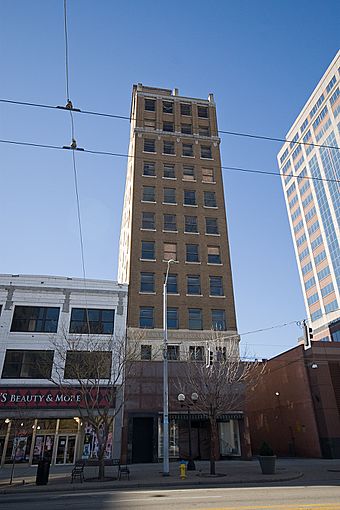Lindsey Building facts for kids
Quick facts for kids |
|
|
Lindsey Building
|
|

Front of the building on an afternoon in the winter
|
|
| Location | 25 S. Main St., Dayton, Ohio |
|---|---|
| Area | Less than 1 acre (0.40 ha) |
| Built | 1917 |
| Architectural style | Chicago, The Commercial Style |
| NRHP reference No. | 85000564 |
| Added to NRHP | March 14, 1985 |
The Lindsey Building is an old and important building in Dayton, Ohio, United States. It's located right in the downtown area. This building was constructed a long time ago, in the early 1900s. Today, it is recognized as a special historic site because of its history and unique design.
Contents
What Does the Lindsey Building Look Like?
The Lindsey Building is made mostly of brick. It sits on a strong stone foundation. Its design is typical of many business buildings from the early 1900s.
Special Design Features
Some parts of the building have a Neoclassical style. This means they look a bit like ancient Greek or Roman buildings. For example, the front of the building has three main sections. It also has smaller, fancy details.
The building stands twelve stories tall. The first two floors have been updated. They now hold modern shops. The main entrance is set back a bit from the street. It is located to the right of the shop areas.
A Look Back: The Building's History
The Lindsey Building was built in 1917. It was made for a person named Theodore Lindsey. This was a time when Dayton was growing very fast and doing well.
Dayton's Growth in the Early 1900s
In the late 1910s, downtown Dayton was expanding a lot. Many new business buildings, like the Lindsey Building, were being constructed. For most of its history, the Lindsey Building has been home to financial institutions. These include the Miami Savings and Loan Company. It also housed the Mutual Home and Savings Association.
Why Is It a Historic Site?
In 1985, the Lindsey Building was added to the National Register of Historic Places. This is a list of important places in the United States. By the early 2010s, it was one of about 100 such places in Dayton.
How It Qualified as Historic
The building earned its spot on the list for two main reasons. First, its architecture is special. Second, it played an important role in local history. It showed how much downtown Dayton grew in the early 1900s.



